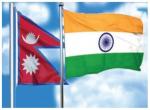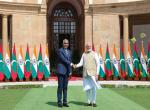Our policy towards Pakistan, as the SAARC summit at Maldives last week showed, is stuck in the double grooves of hope and good faith. We think that India and Pakistan can turn a 'new chapter' in their relationship and believe in the good faith of Pakistan’s leadership in translating their peaceful protestations soon into policy.
'Trust but verify' applies well to disarmament negotiations where intentions can be believed but actions are inspected on the ground. With Pakistan this approach can be relevant to the terrorism question, where Pakistan’s anti-terror claims can be verified by inspecting the ground infrastructure of terrorism through agreed mechanisms. But what is pertinence of verification to the composite dialogue on normalising bilateral relations without linkage to terrorism?
We believe we can build a relationship of trust with Pakistan through a soft and yielding approach. This might make sense if we are largely responsible for blocking the bilateral relationship and acting in ways calculated to make our neighbour feel insecure. We would need then to change course and encourage Pakistan to lower its defensive barriers and react positively to our re-assuring overtures.
Reality is different. It is Pakistan’s Kashmir fixation, the militarisation of its thinking towards India and its use of terrorism that lie at the root of our adversarial relations. Unless there is a fundamental reorientation of Pakistan’s thinking and policies towards India our placatory approach will not produce the results we are looking for.
There is not much evidence of any strategic shift in Pakistan’s thinking on relations with India. Statements of intentions by Pakistani leaders by themselves do not constitute evidence. The Pakistani prime minister may have made reassuring statements to us over four or five meetings, but if results are lacking what value have they? All countries try to give a peaceful and principled public face to their diplomacy, but Pakistan excels in the art of saying one thing and doing another in service of a cause and an ideology centred on confrontation with India.
We have to see some irreversible ground actions by Pakistan on issues of primary concern to us. We should not interpret some tactical shifts induced by immediate compulsions as a fundamental reappraisal of attitudes towards us. Is Pakistan slowly burying the Kashmir issue because it is losing salience internally? Has the military-civil equation there changed to the point that the military’s grip on the country’s India, Afghanistan and nuclear policies has been loosened? Are extremist and terrorist outfits within Pakistan losing ground and the threat of terrorism instigated by jihadi groups targeting India receding durably? If the answers to these questions are negative or far from clear then prudence demands that our policies rest on the firm rock of reality than the soft soil of hope and desire.
On terrorism, the Americans now accuse the ISI of using militant groups as its veritable strategic arm, both against Afghanistan and India, and call Pakistan, as we have long done, an epicentre of terrorism. When the Americans are ratcheting up pressure on Pakistan on the terrorism issue we are unable to capitalise on this diplomatically favourable development because we have been de-emphasising the centrality of this issue to our own fence-mending efforts with Pakistan. If we give terrorism subordinate importance at the bilateral level, we are hardly in a position to add our voice to third party complaints against Pakistan’s conduct.
Not wanting to get involved in the latest US-Pakistan spat because of America’s unclear policies towards Pakistan is one thing, but is there reason to throw diplomatic lifelines to the latter when its international isolation is growing? Why do we counsel the US and Pakistan as our two friends to settle outstanding issues because tensions in our region harm our economic development. Doesn’t the outstanding issue of terrorism concern us and is our region otherwise quite peaceful? With the Americans exposing Pakistan’s double dealing on Afghanistan we state that Pakistan has a positive role to play in that country. If US frustration has compelled it to expose Pakistan’s terror links, our much longer sufferance at Pakistani hands through terrorist violence obliges us, ironically, to deflect attention away from this core problem so that our dialogue with Pakistan is not impeded.
It is a gratuitous diplomatic gift to Pakistan to project its prime minister as a “man of peace”. It unnecessarily burnishes the peace credentials of the top political leadership of a country that remains hostile to us. It makes that leadership look responsible and well-meaning just when its international reputation is getting sullied for ineffectiveness if not double-dealing. There has been nothing dramatic in Gilani’s public positions on India that merits the accolade given to him. On the contrary, as a patriotic Pakistani he has dutifully resorted to the usual Pakistani hard line positions on India-related issues whenever required. Because General Kayani who wields real power in the country cannot be described as a man of peace, we are praising Gilani to make a distinction between the 'peaceful' civilian leadership and the belligerent Pakistani armed forces, a differentiation that serves well the Pakistani establishment in their double-game with India of limited engagement and enduring confrontation. In any case, what good is Gilani as a man of peace if he cannot deliver peace?
Gilani’s handling of the Pakistan government’s confused decision to grant India MFN status hardly does credit to him as a leader boldly committed to peace with India. If the armed forces were backing this decision which lobby made Gilani announce that the Cabinet decision was not to grant MFN status but begin negotiations with India to lead to this happy outcome? Meanwhile, we have lifted our objections to the EU granting textile concessions to Pakistan at the expense of India and others in violation of WTO provisions. At Maldives, while announcing special tariff concessions to LDCs under SAFTA, we have unilaterally extended them to Pakistan even when it has not implemented the SAFTA agreement vis-a-vis India. We have made two unrequited gestures to Pakistan to earn its goodwill even as Pakistan is shilly-shallying with the grant of MFN status.
The problem is not with our vision of peace with Pakistan, it is with our strategy of realising it. Peace cannot be won with concessions.
---------------------------------------------------------------------
Published in New Indian Express : 18th November 2011









Post new comment